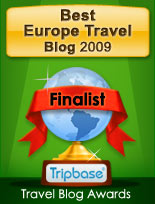It seems like everywhere you turn these days people are talking about money. From $700 billion bailout plans, to plunging stock values, to escalating price of a gallon of milk, there is simply no escaping it. Travelers have their own set of money issues to think about. Saving up, setting a budget and comparing prices are common steps we take when planning for a trip. Hitting the road can get expensive, and many of the big costs are things we have little control over or things that happen unexpectedly. Nevertheless, there are some ways in which those who wander can reign in the money exodus, or at least slow it down.
For example, think critically before you buy something for yourself. When I'm on the road, I feel like going on a shopping spree. Every little trinket, household decoration, and article of clothing looks like a great way to remember my trip. By trying to limit my purchases to items I truly cannot buy back home (i.e., not buying clothes at The Gap in Paris), I've saved a little money and greatly increased the sentimental value of my souvenirs. Speaking of souvenirs, you might be tempted to buy one for every single person in your address book. Don't. Your next door neighbor twice removed doesn't need another Eiffel Tower key chain. Buy special gifts for special people and you'll save both money and time. Eating out at lunch instead of dinner is also a great way to watch the wallet without sacrificing the fun. Restaurants often have less expensive options for lunch. Watch out for "Tourist Passes," which can be found in numerous big city destinations. For one lump sum they offer you access to multiple museums, exhibits, and monuments. They can be helpful in some cases, but make sure you will get your money's worth before you buy. Same thing goes for those tourist buses that drive you around to all the must-sees. They can be costly, and if you're in a city like Paris that is fantastic on foot, totally not worth the price. Lastly, go local. Wine is inexpensive in France, while beer is inexpensive in Belgium. Find your country's staple activity, food, or drink and you'll not only get a taste of the native lifestyle, but you'll also have a few euros/dollars/pounds/yen left over for tomorrow.
Money - how to get it an what to do with it - is often one of the biggest sources of stress in our day-to-day lives. Being on the road can increase the stress, as sudden expenses, poor exchange rates and a slow or stopped income stream all conspire against our feelings of financial security. Thankfully, you do have some control over what happens to your bank account. Better yet, many of the tricks you can use to save money don't demand that you give up having fun for the sake of some spare change. On the contrary, saving on certain things and spending wisely on others can actually increase your enjoyment away from home...and lessen your financial stress when you return.
Monday, September 29, 2008
Subscribe to:
Post Comments (Atom)



2 comments:
I hear ya.The topic of conversation changed from weather to money! I am an avid traveler myself - but getting older has at least one advantage - one doesn't need as much as when one was younger :-) And meeting people and seeing places and collecting memories becomes more important than that gap-shirt. Love your blog. Bearhug from Canada.
Fida: I love a bearhug from Canada! Thanks!
Post a Comment